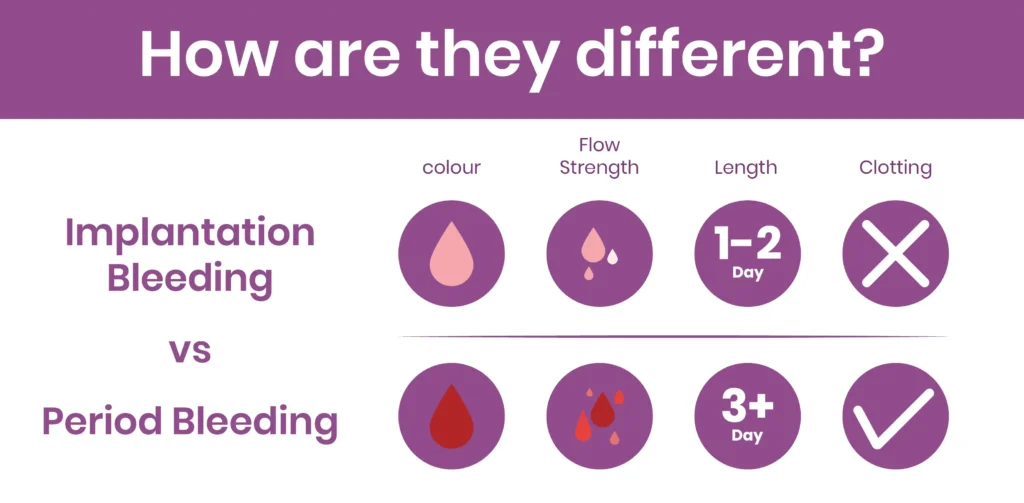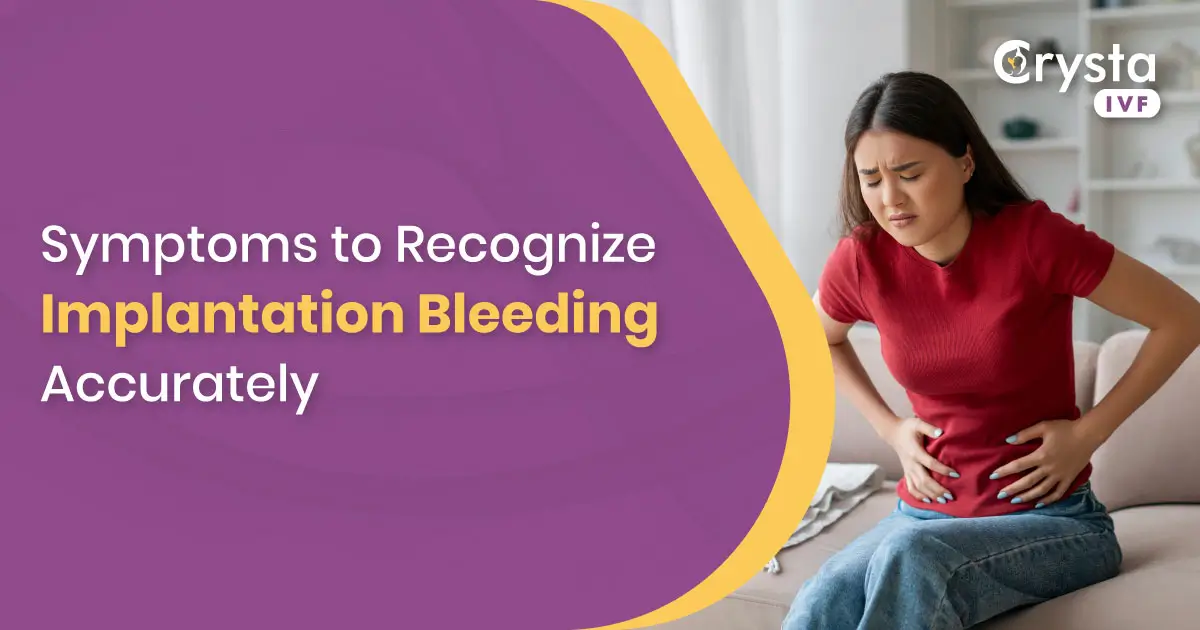One of the most common misconceptions about early pregnancy is missing your period. You may be shocked to hear that when the fertilized egg attaches to the uterine lining, and your nine-month journey commences, a small quantity of blood, known as Implantation Bleeding, can indicate pregnancy.
Implantation bleeding is one of the obvious signs of pregnancy that you might not be aware of. Almost 1/3rd of pregnant women experience implantation bleeding but get it mistaken for period’s blood. Mothers ultimately conclude that they are not pregnant, which results in anxiety and panic.
However, anyone trying to get pregnant must know about implantation bleeding and how to recognize it. This blog will explain everything about implantation bleeding and when you should be concerned about it.
What is Implantation Bleeding
Implantation bleeding occurs about 10–14 days after conception when the fertilized egg attaches to the uterine lining. During this period, women may experience light bleeding, spotting, mild pain, and many other symptoms. Although it happens around the same time as a woman’s menstrual cycle, it is not the same. Compared to menstruation bleeding, implantation bleeding is less intense.
Implantation Bleeding vs Period Bleeding: What’s the Difference?
It’s easy to confuse implantation bleeding and cramps with your monthly period. However, the symptoms are entirely different. They differ in flow rate, length, pain, and blood color.

This is a brief comparison to help you recognize implantation bleeding vs Period Bleeding:
| Implantation Bleeding | Period Bleeding |
| Pink or Brown Color | Dark Red Color |
| The flow is very light | The flow is heavier, which can differ from woman to women |
| One pad/tampon is enough to soak the blood | It requires a lot of menstrual product |
| Occurs for 1-2 days | Occurs for 3-5 days |
| Mild to moderate pain and tightening feeling | Severe to moderate pain in the lower abdomen |
| Tinner and watery in appearance | Thicker and include blood clots |
When Does Implantation Bleeding Occur?
The bleeding generally occurs after the fertilized egg adheres to the uterine lining. It typically takes 9 to 12 days after conception. The travel of an egg from the Fallopian tubes can take as little as six days or as much as 14 days.
Knowing when you ovulated and when your last period started will give you an idea of the implantation. The implantation generally takes 6 -12 days after ovulation or 12 -14 days after your previous cycle. Thus, for an easy understanding, the estimated dates are:
- Implantation after Ovulation: 6-12 days
- Implantation after the Last Period: 12-14 days
- Transmission of fertilized egg from the fallopian tube to the uterus: 6-14 days
- Implantation Blood after conception: 9-12 days
Don’t worry if you experience no implantation bleeding. 70–75% of women who become pregnant report no bleeding. However, it’s common knowledge that any bleeding can be the result of either periods, implantation, or miscarriage.
To be sure, you must consult with an IVF specialist and understand what exactly is the cause of your bleeding. The doctors will also suggest tips for a successful implantation.
How to Recognize Implantation Bleeding?
One of the early indicators of pregnancy is implantation bleeding. Many women are confused about whether implantation bleeding is a probable pregnancy or their period because it happens around the same time as their next cycle.
However, here are some additional symptoms of implantation bleeding that could help you understand and confirm pregnancy. It includes:
- Mild Cramps (less than a menstrual cramp)
- Changes in Mood
- Anxiety and Headaches
- Nausea and Vomiting
- Soreness in the Breasts
- Lower Back Pain
The symptoms are similar to PMS or ovulation, but consulting with a doctor could help you know the difference more clearly.
Also Read: What happens to your body after embryo implantation?
How Common is Implantation Bleeding?
Implantation bleeding is not very common, but it does happen to some women. Studies suggest that only 15-25% of pregnant women experience bleeding. It usually occurs 6 to 12 days after ovulation, when the fertilized egg attaches to the uterus. Many women mistake it for an early period. If you’re unsure whether it’s implantation bleeding or something else, taking a pregnancy test or consulting a doctor can help.
Things You Must Definately Know About Implantation Bleeding
If you are planning for a baby with an IVF procedure, you might have certain doubts, such as why implantation bleeding occurs, what the colour is, how long it lasts, etc. Well, here are some common things you must know about implantation bleeding.
How Long Does Implantation Bleeding Last?
Bleeding after an implant should only last a few hours to two days. The bleeding is quite clear from its appearance that it is due to implantation. Females who have conceived for the first time can observe a little more bleeding than normal.
How Much Do You Bleed During Implantation?
There is hardly any bleeding after implantation. While some people bleed within the first several days after implantation, others just bleed once. When wiping, you’ll usually notice it as a stain on your underpants or toilet paper. Excessive bleeding is unusual after implantation.
What is the Colour of Blood in Implantation Bleeding?
Implantation bleeding colour is usually light pink, brown, or rust-colored and is much lighter than a regular period. It happens when a fertilized egg attaches to the lining of the uterus, causing slight spotting. The color is typically not bright red like menstrual blood because it takes time for the blood to pass through the cervix, giving it a darker or faded shade.
If the bleeding is deep red, heavy, or accompanied by strong cramps, it may not be implantation bleeding and could indicate something else, like an early period or another health concern.
Will I Test Positive If I Have Implantation Bleeding?
You might be wondering if you should get a home pregnancy test if you believe that the blood you are experiencing is from an implantation rather than your period. Yes, during implantation spotting, you can take a home pregnancy test, but if you test too soon, the result may be negative. The reason behind this is:
- Pregnancy tests identify the pregnancy hormone human chorionic gonadotropin, or hCG, which is only created in the body at the time the fertilized egg gets implanted in the uterus.
- It follows that getting a positive pregnancy test before implantation is extremely uncommon.
- The test may not be reliable during the early days as there is less hCG to detect the earlier you take it.
If you’re wondering how long you can test after implantation bleeding, remember that waiting until after the first day of your missed period will give a more reliable test result.

When should I call the doctor for implantation bleeding?
Minimal bleeding during pregnancy is normal, even when not related to implantation. It could be due to certain factors such as vaginal infection, intercourse, or inflammation of the cervix after a pelvic exam.
However, the bleeding can sometimes be due to pregnancy, periods, miscarriage, or after implantation. The reason is difficult to recognize. Hence, you should always consult an IVF specialist to discuss further symptoms of implantation bleeding. However, do not worry much. If the bleeding is minimal and stops quickly, there’s a strong chance that everything is fine.
The Bottom Line
Implantation Bleeding is common. For some women, light bleeding may occur when the fertilized egg is attached to the lining of their uterus, and for others, it may be due to inflammation.
You can get a better understanding of your health and fertility, especially if you have undergone IVF, by being aware of the symptoms and causes of implantation bleeding.
If you are experiencing bleeding for more than 24 hours after IVF, you must immediately book an appointment at any IVF center in India to get yourself checked thoroughly.
Frequently Asked Questions
How to confirm if it is implantation bleeding?
You can’t confirm it yourself for sure. But if you see light spotting (pink or brown), much lighter and shorter than a period, around the time your period is due, it may be implantation bleeding.
What are the early symptoms of implantation?
Early symptoms of implantation include mild cramping, light spotting, bloating, breast tenderness, or feeling more tired.
When does implantation bleeding occur?
Implantation bleeding usually happens about 6–12 days after ovulation.
At what week of pregnancy does implantation happen?
Implantation happens about 3 – 4 weeks of pregnancy (counting from the first day of your last period), which is about 6 – 12 days after ovulation.
How to differentiate between implantation bleeding and a period?
- Implantation bleeding is lighter, shorter (a few hours to 2 days), and usually pink or brown.
- A period is heavier, lasts longer (3 – 5 days), and is bright or dark red with clots sometimes.
What does failed implantation look like?
You won’t usually see or feel anything specific for a failed implantation. It might just seem like a normal period arriving on time or a bit late.
How to confirm implantation without bleeding?
Not everyone has implantation bleeding. The only way to know is to take a pregnancy test about 2–3 days after a missed period.
If I have implantation bleeding, will a pregnancy test be positive?
No, not right away. You should wait about 2–3 days after the bleeding stops, or take a test when your period is late for more accurate results.
How long does implantation bleeding last?
The implantation bleeding lasts a few hours to 2 days at most.
Does implantation mean you are pregnant?
Yes. If implantation happens, it means the fertilised egg has attached to the uterus and pregnancy has begun.
Can implantation bleeding be red?
It’s usually pink or brown, but in some cases it can be light red. If it’s heavy and bright red like a period, it’s likely not implantation.




